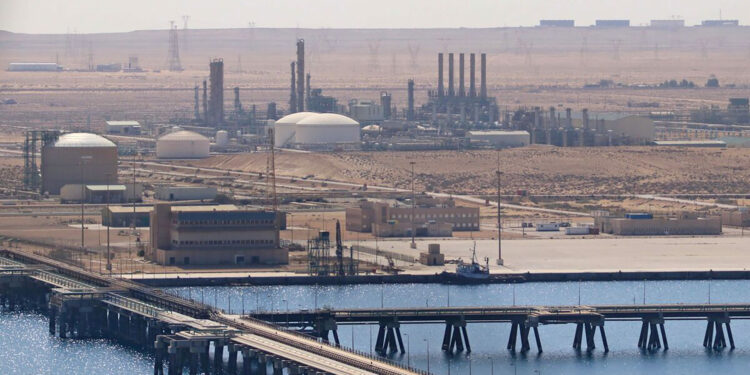Two engineers at Libya’s Hariga port (northeast of the country) told Reuters news agency on Saturday that the port is now out of service and not exporting crude oil due to a dispute between two governments in the east and west of the country that has resulted in the closure of most fields. The National Oil Corporation warned that “the repeated closures lead to the loss of a large part of oil production, cause the deterioration of the sector’s infrastructure and dissipate efforts to achieve the plan to increase production.”
A crisis that flared last week over control of Libya’s central bank threatens a new wave of instability in a major oil-producing country divided between factions in the east and west.
The administration, based in the east of the country and controlling fields that account for almost all of Libya’s oil production, is demanding that the authorities in the west reverse their decision to replace the central bank governor, a key position in a country where control of oil revenues is a major prize for any faction.
The engineers said today that exports through the Hariga port have stopped after production was reduced and the Sarir field, the main source of supplies to the port, was almost completely shut down.
“The tanks are almost empty. The last shipment left the port yesterday,” they added.
The Sarir field (which exports its production through the Hariga port) usually produces about 209,000 barrels per day.
This comes after news that the eastern-based government issued an order to halt oil loading operations at the ports of Brega, Es Sider, Ras Lanuf, Zueitina and Hariga, according to what Bloomberg reported, citing people familiar with the matter who declined to be identified because the information is private.
Oil production has more than halved this week to less than 450,000 barrels per day since eastern authorities announced on Aug. 26 they would halt all production and exports. Supplies to terminals including Es Sider, the country’s largest port, and Ras Lanuf have been affected. Some exports have continued after the order, with oil already being loaded.
Libya pumped an average of about 1.18 million barrels per day in July.
Oil is the backbone of the economy.
Libya’s National Oil Corporation said in a statement on Friday that the recent closure of oil fields has caused the loss of about 63% of the country’s total oil production. This comes five days after the government controlling eastern Libya and appointed by parliament declared a state of “force majeure” on the entire oil sector, halting production and exports.
The National Oil Corporation warned that “the oil sector is the safety valve for Libya, as its workers represent all parts of the country, from the east, west and south. This sector embodies Libya’s unity and is the backbone of its economy and the future of its coming generations.”
The corporation stressed that “repeated closures lead to the loss of a large part of oil production, cause the deterioration of the sector’s infrastructure, and dissipate efforts made to achieve the plan to increase production.”
She stated that “restarting the stopped fields will require huge costs and double technical efforts, which will increase the burdens on the institution and the national economy.”
The institution explained that its teams “are currently working to reduce the damage as much as possible, alleviate its impact on citizens, and assess the losses resulting from the closures.”
She expressed her expectations of “a quick resolution to the crisis.”
Until last Wednesday, the losses from the oil and gas shutdown in Libya amounted to more than “$120 million in 3 days,” according to a statement by the National Oil Corporation on Thursday, which showed a decline in the rates of normal oil production from 1,279,386 barrels last Monday (the day the shutdown began) to 591,024 barrels last Wednesday.
Libya depends on oil export revenues by 90%.
Since mid-August, Libya has been experiencing tensions due to the crisis of the Presidential Council issuing a decision to dismiss the Governor of the Central Bank, Al-Siddiq Al-Kabir (who refused to hand him over) and appoint Muhammad Al-Shukri in his place, a measure that was rejected by the House of Representatives and the State Council because it was issued by an “unauthorized” party.
In addition to the recent central bank crisis, Libya has been experiencing another crisis for 3 years, represented by a conflict between the Government of National Unity headed by Abdel Hamid Dbeibah, based in Tripoli, which runs the entire west of the country and enjoys international and UN recognition, and the second government, Osama Hamad, based in Benghazi, which runs the entire east of the country and cities in the south.



